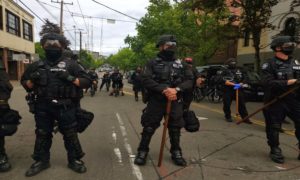Spend one quarter at Seattle Central and you’re guaranteed to see something strange. The most dramatic stories revolve around shifty people bringing concealed weapons onto campus. The usual addict shooting up in the bathroom or individual masturbating in the library no longer warrant a gasp – you’ll soon discover that it’s just the norm.
But we had to wonder, if those are only the rumors and stories floating around campus, what else has security dealt with? What do their days look like? We sent an editor to shadow long-serving, silver-haired security guard, Tracy Yorker, to learn the reality inside Seattle Central’s Safety and Security.
We found out that it actually is all it’s cracked up to be, but not all the time. Some days they’re tasked with calming down a student armed with two butcher knives holding hostages in the teachers’ lounge. Some days it’s recording logs, opening classroom doors, and clearing out homeless campers from the night before. In this strange mix of mundanity and mania, we learn what a day in the life of a SCC security guard actually looks like.

This interview has been edited for clarity and length.
SC: Let’s start with the craziest experience you’ve had as security at SCC.
T: Okay, I’ll tell you about the Kenny Hung hostage scenario that happened. There was an international student who had mental health issues and they broke down here. They were enrolled here, but they were failing and they kind of went into this ‘AARGHH!’ thing with two butcher knives and it was pretty scary. We came up to the third floor and we could hear him yelling at two staff members in an office – like hostages. Anyways, we did get him out and he was arrested and no one was injured, except for Kenny who cut himself on the arm. That was one incident 23 years ago or more, but one of the staff members, she ended up leaving teaching because she was so traumatized.
SC: Those kinds of situations don’t happen often, I take it. What do your days usually look like, craziness aside?
T: The first shift starts at 5 a.m., and I get in around 7. We do our morning evics (short for evictions) around campus – there are a couple of popular camper spots where we sometimes find seven or eight people sleeping in. It costs the campus time and money, whether it’s putting in infrastructure to keep them out or having to clean up the debris and other things they leave. They’re also responsible for a lot of the bike and property theft around here.
SC: What role does the neighborhood play in this?
T: The overall changes in Capitol Hill have brought a different demographic of people. There’s definitely that hybrid of hippies and transient bohemians, but there are also the mental health folks. We’re right here in the heart of the city so it’s dense and there are a lot of social services, and drugs, that draw them in. It’s a rougher contingent of the public here.
SC: So in addition to removing campers, what are other things you look for when you do your perimeter walk around?
T: On Broadway, a lot of the day is trying to encourage people to smoke outside of the nearly imperceptible line, especially when it’s rainy out and people want to huddle out under the covering. And that’s just kind of the daily– I don’t want to say mundanity of the job, but it’s just the things you try to do when you’re walking around campus, talking to people, doing the service calls – like room changes, instructors not being able to get into rooms, lost key cards, that sort of thing.
Tracy walks me over to an alcove doorway entrance on Broadway.
T: People like to camp in here, but it’s also a popular pee and poop area. There used to be a gate here that kept campers out but because of fire safety codes it had to come down. It’s also money though; there’s only so much money and ability to build things that are needed. Another Broadway special is Amplified Preacher Boy. He’s that gung ho, really fundamentalist Christian. Well he really pisses people off. He used to have this bull horn and he has this massive sign and is very anti-Muslim. He has this very rigid, brittle take on Christianity and on God’s word, and he wants to come out here and shove it in people’s faces.
SC: You’ve been here for over two decades and have seen the neighborhood evolve. How has your job changed over the years?
T: We’re not just an enforcement, we’re also another resource you can come and talk to. With the current administration, we’re hearing a lot from students who struggle with DACA. Mental health issues are also one of our main concerns – there’s not enough resources to support their needs so we try to help out when we can.






Comments are closed.